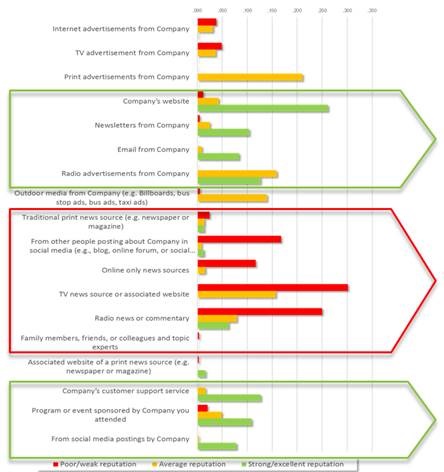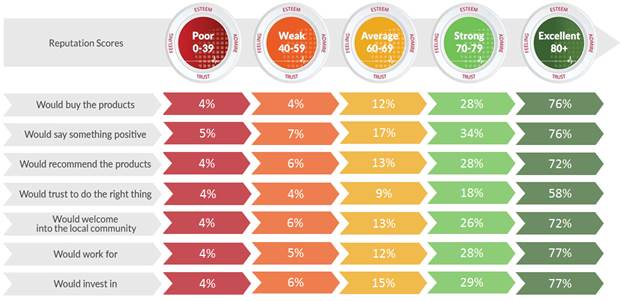The Lego Group, IKEA and Microsoft top the UK CSR RepTrak® 2016 ranking of the 150 most reputable companies in terms of their CSR performance. The research comes from leading reputation consultancy Reputation Institute, and is based on over 50,000 interviews with the UK general public.
THE CSR REPUTATION RANKING
Lego tops the ranking for the first time in three years. The top ten most reputable companies in terms of CSR are listed below:
| Rank | Company | 2016 RepTrak® score |
| 1 | Lego | 82.0 |
| 2 | Ikea | 80.9 |
| 3 | Microsoft | 78.6 |
| 4 | John Lewis Partnership | 78.0 |
| 5 | Rolls-Royce Aerospace | 77.9 |
| 6 | BMW Group | 77.8 |
| 7 | The Estée Lauder Companies | 77.7 |
| 8 | Sony | 77.4 |
| 9 | Intel | 77.2 |
| 10 | The Walt Disney Company | 77.2 |
The CSR RepTrak® system measures a company’s ability to deliver on stakeholder expectations across three dimensions of CSR: “Citizenship” (support of good causes, positive societal influence and environmental responsibility), “Governance” (openness and transparency, ethical behaviour and fair business practices) and “Workplace” (fair employee rewards, employee wellbeing and equal opportunities).
Companies are ranked on a score from 0-100 and are grouped as Excellent (80+), Strong (70-79), Average (60-69), Weak (40-59) or Poor (Below 40).
The industries with the best perceived CSR practices are the Consumer Product sector (scoring 70.4 overall), Healthcare (69.7) and Industrial Products (69.5). Financial Services (64.2), Transport (62.5) and the Energy (58.9) sectors are at the bottom of the ranking with the poorest CSR scores.
BIGGEST MOVES
· Burberry Group (+10.6) now ranked 56th
· HSBC (+9.8 points) now ranked 158th
· Campbell Soup Company (+9.7 points) now ranked 24th
· Volkswagen (-28.9 points) now ranked 180th
· Daimler (Mercedes-Benz) (-7.9 points) now ranked 94th
· EDF (-7.7 points) now ranked 172nd
Following the emissions scandal Volkswagen’s score dropped by 28.9 points overall, and by 37.7 points in the “Governance” dimension.
UK COMPANIES UNDERPERFORMING
Of the ten companies perceived to have the best CSR practices, John Lewis Partnership and Rolls-Royce Aerospace are the only two that are UK-domiciled. John Lewis came in at number four and has been in the top 10 for the last three years; Rolls-Royce placed fifth, having debuted third in 2015.
Non-UK companies also dominate the top 50.
Kasper Ulf Nielsen, Executive Partner at Reputation Institute, comments “This reveals a lack of both emotional and rational connection with businesses which is unique to the UK. Across the world, companies in their home countries tend to have a stronger reputation, and this lack of reputation capital puts UK plcs at a disadvantage in their home market.”
COMPANIES WITH STRONG OVERALL REPUTATIONS FALLING DOWN ON CSR
Over a third of companies in the overarching UK RepTrak® have significantly underperformed on CSR perceptions when compared to the overall emotional connection consumers have with the company.
Amazon has an excellent reputation score of 82, but their CSR index was 15.4 points lower at an average 64.8. Daimler (Mercedes-Benz) and Aldi have suffered similarly, with Daimler having an overall score of 80.4 and a CSR score of 69.8 and Aldi having also having an excellent overall reputation score of 80.9 but a CSR score of 71.1.
Nielsen comments, “Weak CSR scores for companies who have strong overall reputations demonstrate that doing good remains difficult to communicate well enough for it to stick in the minds of consumers. Amazon, Daimler and Aldi are proficient at communicating with their key stakeholders, as seen by their overall scores, but are really struggling to come across positively in terms of Governance, Workplace and Citizenship, leaving them open to reputation risk.”
LACK OF CLEAR COMMUNICATION
The 2016 UK CSR RepTrak® reveals that the UK general public has a far greater understanding of companies’ products and services, innovation, leadership team and company performance, than they do about CSR initiatives. 27% of the UK general public are unaware of how companies treat their workforce, 22% do not know what businesses are doing in terms of “Citizenship” (support of good causes, positive societal influence and environmental responsibility), and 18% are uninformed about “Governance” principles (openness and transparency, ethical behaviour and fair business practices).
Nielsen continues, “The UK public are beginning to care more and more about businesses’ social and environmental footprints. Looking at the examples of Sports Direct and Volkswagen, arguably two of the largest reputational crises in the last year, both experienced reputational damage in terms of CSR, and both have seen a blow to their reputations alongside a significant financial impact.”
Following Sports Direct’s reputational crisis, the company has a weak CSR percpetion scorescore of 53, and a score of just 43 for the “Workplace” dimension. The company has dropped out of the FTSE 100 and had £1.6 billion wiped off its value, demonstrating how consumers have taken an active decision not to buy Sports Direct products as a result its poor workplace environment becoming public knowledge.
CHANNELS THAT BUILD CREDIBILITY
Reputation Institute’s research also reveals that, for companies with a weak reputation, third party communications have a much stronger impact on the general public’s perception of CSR.
For companies with a strong reputation, controlled communications via a business’ website, newsletters, customer support service or sponsored events have the strongest impact on CSR perception.
WHY REPUTATION MATTERS
Reputation Institute’s research reveals that reputation drives business results. The better the reputation, the more support a company gets. For companies with an Average reputation, only 12% would definitely buy the products; this climbs to 28% if the reputation is Strong, but increases to 76% if the reputation is Excellent. At present, only four companies sit in this category.
“The impact reputation has on business success is massive, which is why the leading companies in the world are managing and measuring this asset in a systematic way,” says Nielsen.
In the UK, consumers must consider companies’ reputations “Excellent” in order to have more than 50% of those surveyed claim that they would say something positive about a company, recommend its products, trust it to do the right thing, welcome it into the local community, and work for or invest in it.
Download the full 2016 UK CSR RepTrak® report at: https://www.reputationinstitute.com/Resources/Registered/PDF-Resources/2016-UK-CSR-RepTrak.aspx



